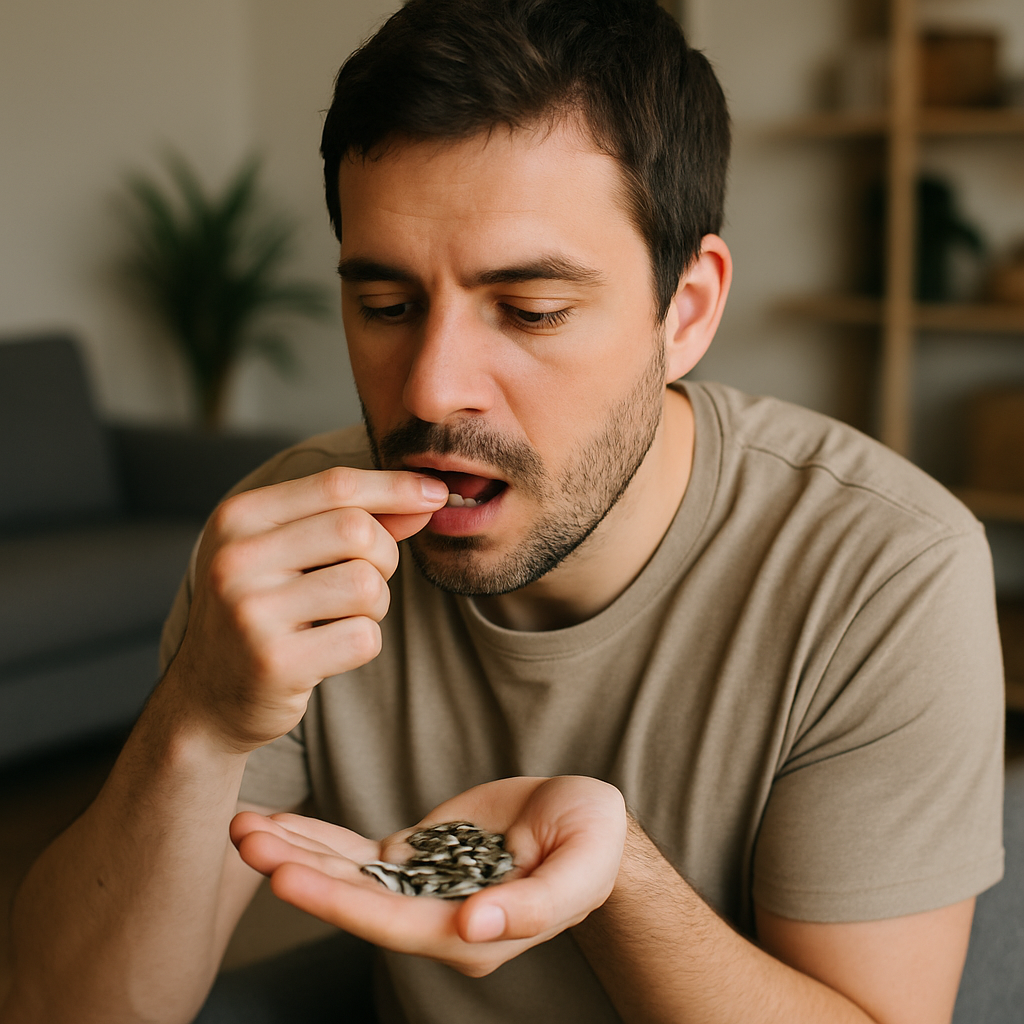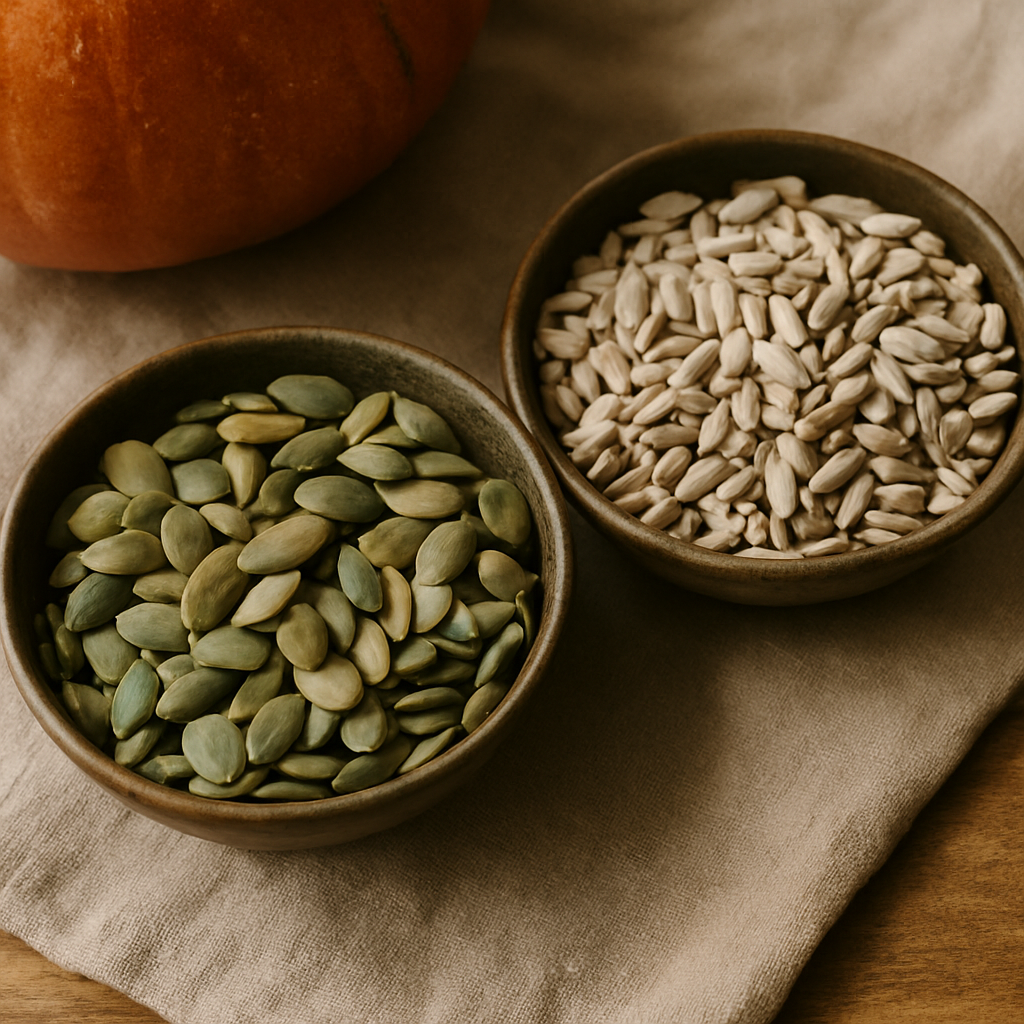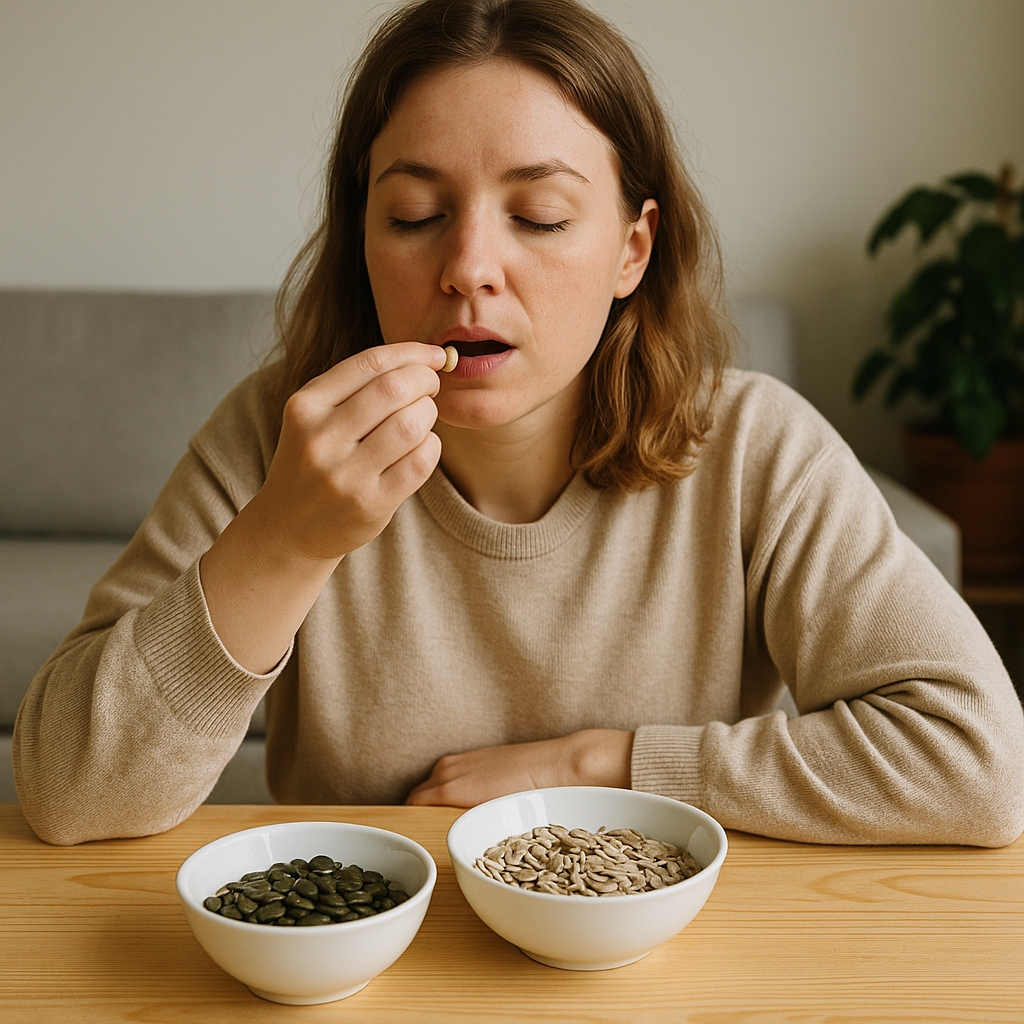How to Eat Pumpkin and Sunflower Seeds for Maximum Benefits

If you’re wondering how to eat pumpkin and sunflower seeds in a way that truly boosts your health, you’re not alone. These tiny powerhouses pack a punch, but knowing the best way to consume pumpkin seeds and sunflower seeds can make a huge difference in how much you benefit from them. Whether you’re curious about the benefits of pumpkin seeds and sunflower seeds or want practical tips on how to eat them daily, this guide will walk you through everything — from the best time to eat sunflower and pumpkin seeds to creative uses and even Ayurvedic insights.
Sunflower and pumpkin seeds have become increasingly popular as snack options and nutrient boosters. But many people still ask: can you eat sunflower seeds and pumpkin seeds together? And how much pumpkin and sunflower seeds to eat daily is optimal? This article dives into all those questions, helping you get the most from these nutritious seeds.

Why Pumpkin and Sunflower Seeds Are Good for You
First off, let's talk about why pumpkin and sunflower seeds are so widely praised. These seeds are loaded with essential nutrients like magnesium, zinc, and healthy fats, which contribute to heart health, immunity, and even better sleep. The benefits of pumpkin seeds and sunflower seeds go beyond just being a tasty snack — they support everything from brain function to skin health.
Pumpkin and sunflower seeds uses are versatile, making them a perfect addition to almost any diet. Both seeds contain antioxidants that help reduce inflammation, plus they provide a good source of protein for those looking for plant-based options. Not only that, but these seeds are rich in fiber, helping with digestion and keeping you fuller for longer.
How to Eat Pumpkin and Sunflower Seeds Daily
Eating pumpkin and sunflower seeds daily can be a great way to supplement your diet, but knowing how to consume pumpkin seeds and sunflower seeds correctly ensures you get the maximum benefits without any downsides.
Raw, Roasted, or Soaked – What’s Best?
You might be wondering if it’s better to eat pumpkin and sunflower seeds raw, roasted, or soaked. Well, each method has its own perks. Raw seeds keep most of their nutrients intact but can be harder to digest for some people. Roasting enhances flavor and crunch but can reduce certain heat-sensitive vitamins. Soaking seeds can help reduce phytic acid, a compound that might hinder mineral absorption.
So, the best way to eat pumpkin and sunflower seeds often depends on your personal preference and digestive comfort. A little trial and error is perfectly okay here!
How Much Pumpkin and Sunflower Seeds to Eat Daily
When it comes to how much pumpkin and sunflower seeds to eat daily, moderation is key. Experts usually recommend about a small handful — around 1 to 2 tablespoons or roughly 20 to 30 grams — of each seed per day. Eating too many might lead to excessive calorie intake or digestive discomfort. Keeping the portion reasonable helps you enjoy the benefits without overdoing it.
Best Time to Eat Sunflower and Pumpkin Seeds
Wondering about the best time to eat sunflower and pumpkin seeds? The answer isn’t one-size-fits-all, but generally, adding them to your diet in the morning or early afternoon can be very beneficial. Eating these seeds as part of breakfast or a midday snack helps maintain your energy levels throughout the day. Thanks to their protein and healthy fat content, they provide lasting satiety and steady blood sugar.
Some people also find eating pumpkin and sunflower seeds before bed helpful, especially pumpkin seeds, which contain tryptophan—a precursor to serotonin and melatonin, hormones that promote better sleep. So, a small evening snack of pumpkin seeds might just be your new bedtime ritual!

Can You Eat Pumpkin and Sunflower Seeds Together?
Absolutely! Can you eat sunflower seeds and pumpkin seeds together? Yes, and it might actually be a great idea. Combining these seeds can maximize their nutrient profile since each offers unique vitamins, minerals, and antioxidants.
Synergistic Benefits of Eating Both
Eating pumpkin and sunflower seeds together creates a synergy that’s greater than the sum of their parts. Pumpkin seeds are high in magnesium and zinc, which support immune health and muscle function. Meanwhile, sunflower seeds are packed with vitamin E, an antioxidant that protects your cells from damage. Together, they provide a balanced nutrient boost that’s perfect for snacking or adding to meals.
Mixing these seeds also diversifies your intake of healthy fats and proteins, which can help improve your overall diet quality and keep meals interesting.
Who Should Avoid This Combination?
While pumpkin and sunflower seeds are generally safe for most people, those with allergies to seeds or specific digestive conditions should be cautious. People with certain nut or seed allergies might experience reactions, and overconsumption can cause bloating or discomfort due to high fiber content. If unsure, it’s best to start with small amounts and observe how your body reacts.
Creative Ways to Include Pumpkin and Sunflower Seeds in Your Diet
Adding pumpkin and sunflower seeds to your meals doesn't have to be boring or bland. There are plenty of delicious and creative ways to use them.
Breakfast Ideas: Smoothies, Oatmeal, and Toast
One simple way is tossing these seeds into your morning oatmeal or yogurt. They add a nice crunch and a nutrient boost. You can also blend sunflower and pumpkin seeds into smoothies — they blend surprisingly well and create a creamy texture without overpowering the flavor.
For toast lovers, sprinkle them over avocado or nut butter spreads for an added crunch and a dose of healthy fats.
Seed Mix Recipes and Snacks
Another tasty option is creating your own seed mix by combining roasted pumpkin and sunflower seeds with dried fruits and nuts. This mix is perfect for on-the-go snacking and offers a satisfying combination of textures and flavors.
You can also bake them into homemade granola bars or add them to salads and soups for extra nutrition and crunch.

Ayurveda’s View on Pumpkin and Sunflower Seed Consumption
In Ayurveda, pumpkin and sunflower seeds are valued not only for their nutrition but also for their energetic properties. Pumpkin seeds are believed to balance Vata and Kapha doshas thanks to their grounding and warming qualities. Sunflower seeds, meanwhile, can pacify Vata and Pitta but may increase Kapha if eaten excessively.
How to use pumpkin seeds and sunflower seeds in Ayurveda often involves mindful moderation and combining them with warming spices like ginger or cinnamon. Eating these seeds soaked or lightly roasted is preferred to enhance digestion and absorption. This ancient wisdom aligns well with modern insights on soaking seeds to reduce antinutrients and improve nutrient bioavailability.
Conclusion
So, how to eat pumpkin and sunflower seeds to reap their maximum benefits? The answer is pretty simple: enjoy a modest daily amount, choose your favorite preparation method—raw, roasted, or soaked—and mix them into your meals or snacks throughout the day. Whether eaten together or separately, pumpkin and sunflower seeds offer a wide range of health benefits, from improved heart health to better sleep.
Remember, the best time to eat sunflower and pumpkin seeds depends on your personal routine, but mornings and early afternoons are great for energy, while a small evening snack of pumpkin seeds might help you sleep better.
If you’re looking to spice up your diet, try adding these seeds to smoothies, oatmeal, or your homemade seed mixes. And for those curious about traditional approaches, Ayurveda offers valuable insights on how to consume pumpkin seeds and sunflower seeds mindfully.
Try incorporating these nutrient-packed seeds into your daily life—you might be surprised how such simple additions can boost your health and delight your taste buds!
FAQs
Can I eat pumpkin and sunflower seeds without soaking?
Yes, you can eat them without soaking, but soaking can help reduce phytic acid and improve digestibility. If you don’t soak them, opt for roasted or raw versions to suit your digestion.
How many sunflower and pumpkin seeds per day?
A good rule of thumb is about 1 to 2 tablespoons (20-30 grams) of each seed daily. This amount provides benefits without overdoing calories or fiber.
Are there any side effects of eating sunflower and pumpkin seeds?
For most people, these seeds are safe. However, eating too many may cause digestive upset or allergic reactions in sensitive individuals. Moderation and awareness of your body’s response is key.
If you enjoyed learning how to eat pumpkin and sunflower seeds, share this article with your friends and family so they can also discover the many benefits of these humble seeds. Your health journey is just a handful of seeds away!
Got any more questions?
Ask Ayurvedic doctor a question and get a consultation online on the problem of your concern in a free or paid mode.
More than 2,000 experienced doctors work and wait for your questions on our site and help users to solve their health problems every day.

